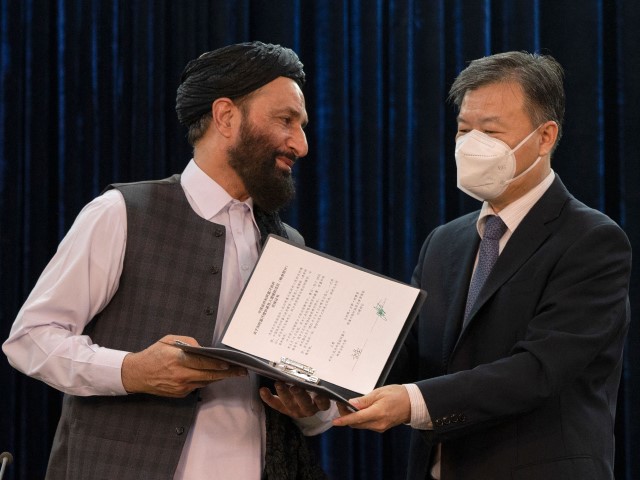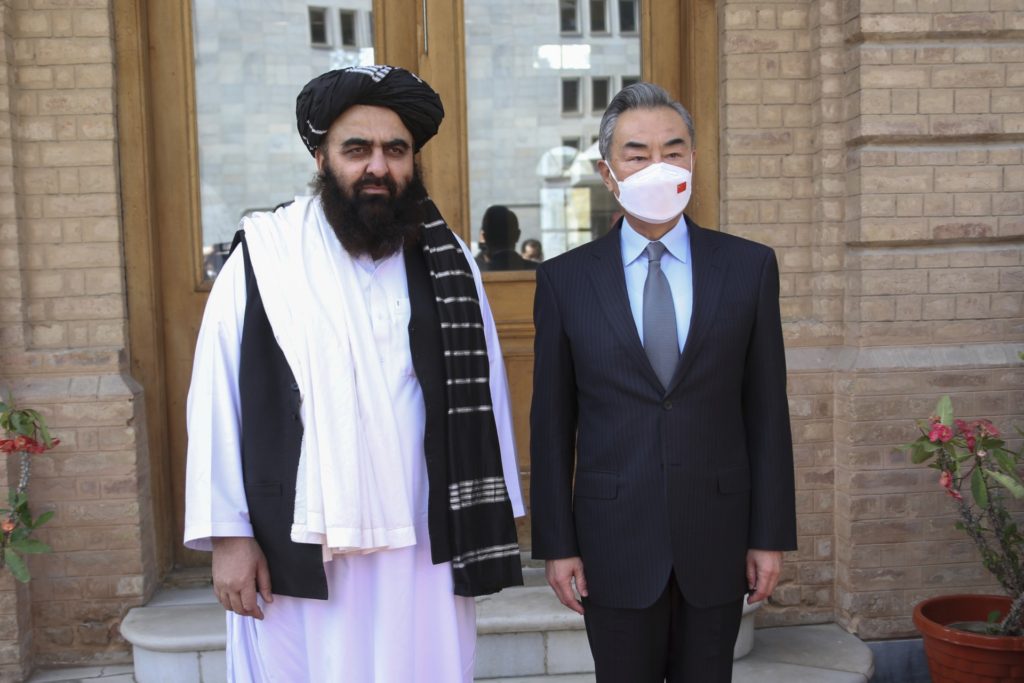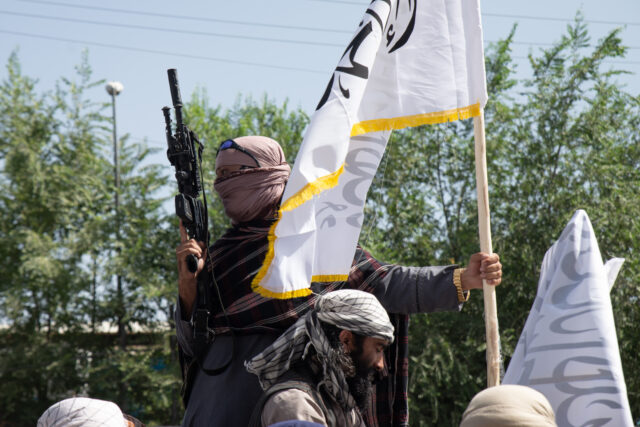China’s top diplomat in Afghanistan effusively praised the Taliban in an interview published Tuesday to mark the end of the U.S. military presence in the country, crediting the terrorist organization with engaging in “practical measures” that have brought the country “positive improvements.”
The Taliban is a radical jihadist organization that ruled Afghanistan for much of the 1990s and was deposed by the American invasion following the terrorist attacks of September 11, 2001. Following far-left President Joe Biden’s decision to extend the 20-year Afghan war beyond the May 1, 2021, deadline his predecessor Donald Trump had set in negotiations with the Taliban, the terrorists launched tens of thousands of attacks on the U.S.-backed government, culminating in their uncontested return to power on August 15, 2021.
The Taliban has retained power for two years partially through fostering close ties with the Communist Party of China, a feat that requires the self-identified Islamic organization to ignore the fact that dictator Xi Jinping is currently orchestrating a genocide of Muslim people on the border with Afghanistan. The Taliban joined the Belt and Road Initiative (BRI), China’s predatory debt program, in May, and has boasted agreements with Beijing to build universities, factories, and a sophisticated national surveillance system.
No foreign government has recognized the Taliban as the official government of Afghanistan, though no other parties in Afghanistan contest its rule (former President Ashraf Ghani, who immediately fled Afghanistan upon the arrival of Taliban terrorists to Kabul in 2021, has claimed to remain president but has no power or influence in the country). China, however, has recognized the Taliban as an “interim” government body and addresses it as such, alongside Iran and several other neighboring countries.

File/Ghulam Ghaws Naseri (L), the acting minister of state for disaster management and humanitarian affairs of Afghanistan and China’s ambassador to Afghanistan, Wang Yu, exchange documents for oil exploration permits in Kabul on July 5, 2022. (WAKIL KOHSAR/AFP via Getty)
Speaking to the Chinese government propaganda outlet Global Times on Tuesday, Zhao Haihan, the Chinese Embassy in Kabul’s Charge d’Affairs, celebrated the Taliban’s alleged successes in the past two years and vowed that Beijing would back the terrorist group every step of the way during their tenure in power.
“Since the establishment of the Afghan interim government [the Taliban terrorist organization] two years ago, it has been committed to promoting national peace reconstruction and independent development,” Zhao claimed, “actively engaging in foreign exchanges and cooperation.”
Zhao demanded the world “give an objective and fair assessment” of the Taliban’s “practical measures” in “economic development, corruption eradication, drug prohibition, improvement of people’s livelihoods, and social security.” He described Afghanistan as “gradually recovering” from the war and development as “slowly improving.”
“In the reports by some Western media outlets, Afghanistan seems to be on the verge of economic collapse with starving bodies everywhere. But you will see completely different scenes if you visit major cities in Afghanistan,” Zhao claimed, “Daily necessities and supplies are basically available; there is a wide variety of food and vegetables, and the supply of electricity, communication, and fuel is also stable, with social order being well-maintained.”
In reality, nearly all charity and humanitarian aid organizations working in Afghanistan describe a growing humanitarian disaster driven by the absence of regular access to food, medicine, and other basic needs. The World Food Program (WFP) warned this month that 30 million Afghans are “in dire need of assistance” and 3 million of those live in remote areas where they face the particular risk of starvation during the winter.
The office of the Special Inspector General for Afghanistan Reconstruction (SIGAR), an American watchdog agency, accused the Taliban in its August report of hoarding food and medical aid and using it for political gain, worsening the crisis.
“[I]t is no longer a question of whether the Taliban are diverting assistance from our programs to help the Afghan people, but rather how much they are diverting,” The SIGAR, John Sopko, wrote in the introductory letter to the report. “[M]y staff and I find the degree of interference and the apparent inability of the UN to protect its programs deeply troubling.”
Zhao, the Chinese Charge d’Affairs in Kabul, nonetheless claimed that any challenges Afghan civilians were facing were not the fault of the Taliban, who “took over a mess and faced external economic blockades, financial sanctions, asset freezes, and other difficulties.” The Chinese government regularly pressures Washington and international financial institutions to give money to the Taliban and lift human rights sanctions, ignoring the fact that, as the SIGAR report details, America is the single largest donor to Afghan humanitarian efforts in the world.

File/Chinese Foreign Minister Wang Yi, right, poses for photos with Amir Khan Muttaqi, acting foreign minister of the Afghan Taliban’s caretaker government, in Kabul, Afghanistan on March 24, 2022. Chinese leader Xi Jinping on Thursday, March 31, 2022 issued strong backing for Afghanistan at a regional conference, while making no mention of human rights abuses by the country’s Taliban leaders. (Saifurahman Safi/Xinhua via AP)
In contrast, China has “contributed Chinese wisdom and solutions” to the country, Zhao said, taking credit for funding the Taliban’s alleged successes.
“China is the only major country and neighboring country in history that has never bullied Afghanistan, and China has always pursued cooperation, assistance, and friendship with Afghanistan,” Zhao claimed.
Zhao celebrated the Taliban conquest and committed China to helping “the Afghan people [usher] in an opportunity to truly control their own destiny.” The Taliban have not held and election in two years and have no public plans to do so; the Afghan people played no role in its return to power and have no voice in the radical Islamist dictatorship.
Zhao’s remarks follow a similar celebratory statement from the Chinese Foreign Ministry on August 15, the anniversary of the Taliban’s takeover of Kabul.
“Two years on, with the active support of Afghanistan’s neighbors and other countries in the region, the transition in Afghanistan has been generally stable, and the future of the nation is back in the hands of its people — a historic achievement,” spokesman Wang Wenbin told reporters. “The interim government [the Taliban] has taken a number of practical measures in recovering its economy, improving people’s livelihood, prohibiting narcotics, fighting corruption and safeguarding security.”
Follow Frances Martel on Facebook and Twitter.

COMMENTS
Please let us know if you're having issues with commenting.